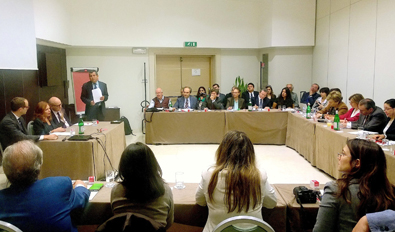Last 30 September, the FPSC Latin America Forum in Rome organized a new meeting between diplomats and journalists in order to deepen on the consequences of the apostolic trip that Pope Francisco made to Cuba and the United States, from 19 to 27 September.
The meeting “The impact of the visit of Pope Francisco to Cuba and the United States” was held at the Hotel NH Giustiniano (Via Virgilio, 1) in Rome.
On this occasion it was counted as speakers with three journalists traveling with the Pope to America: Mexican, Valentina Alazraki; and Americans, Frank Rocca and Alan Holdren.
The journalist Valentina Alazraki claimed that the trip of Pope Francisco to Cuba and the United States had changed the perception that these countries had of him. Before this trip, Americans perceived him as a Pope who would condemn capitalism, the US system; Cubans, as a pontiff who would support its egalitarian vision of society. However, the issues addressed by the Pope were others. In Cuba he spoke about religious freedom, insisting in seeking what unites and does not divide. He did not seek confrontation but harmony.
Other issues discussed by Alazraki were the political repercussions on the subject of migration and the death penalty, on which the journalist was pessimistic, because, she said, the influence of one Pope has never had a political impact, although it did in moral. She also highlighted the issues of immigration and paedophilia, raised in Philadelphia, emphasizing the Pope encouragement to immigrants to keep their roots, and solidarity with the victims of paedophilia, delivering a strong speech, even over bishops and their responsibility. Other issues subtly discussed were the defence of life and the marriage between a man and a woman open to life, without uttering the words “abortion”, “euthanasia” or “homosexuality”.
Finally, on dissidents detained, the journalist Alazraki said it could seem the weak point of the trip, because although the Nunciature in Cuba had had telephone contact with some dissidents, telling them that if they were there when the Pope went by he would greet them, such meeting never happened, at least publicly. However, she said that this does not denote lack of attention, but there must have been some important reason. Do not forget, said the journalist that the Holy Father brought with him Paul Richard Gallagher, Deputy Secretary for Relations with the States. She also stressed that carrying forward the process initiated in Cuba was perhaps more important than taking direct contact with them.
Alan Holdren, por su parte, destacó la forma en la que el Papa plantea las cuestiones, que es distinta a la de Papas anteriores, aunque el mensaje de la Iglesia continúe siendo el mismo. Asimismo, recalcó los temas como el derecho de la libertad de conciencia, a raíz de la problemática suscitada por las hermanas que desde su clínica se mostraron contrarias a las políticas sanitarias contraceptivas del Gobierno; o las repercusiones que el viaje del Papa ha generado, aún después de que este haya finalizado, como que se produjese la ejecución de una mujer en Georgia, a pesar de su carta disuasoria. También destacó la importancia de que el mensaje del Papa se haya podido escuchar íntegramente a través de la televisión.
Also he considered important that the Holy Father has been presented as “son of emigrants and brother of this people,” something of special importance for Americans.
For his part, Frank Rocca focuses on the Pope’s message and the clarity of his presentation, noting that the Pope did not speak, as expected, in these two countries as did John Paul II in Poland. Although the Pope has been heard and understood by the bishops, Havana and the White House, he has addressed issues “almost without touching them”, encouraging, without shouting things. This, the American journalist believes, has disappointed US Catholic militants given the importance of these issues, which in the coming years could become a problem. “The bishops follow him, the layman understands him a little less” he said. There is an internal problem not easy, although “the faithful are not going to criticize the Pope.”





